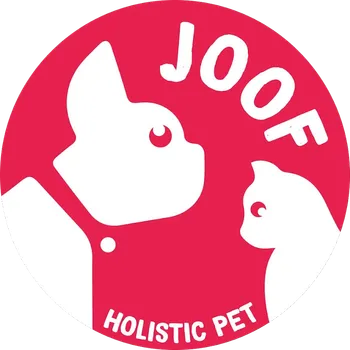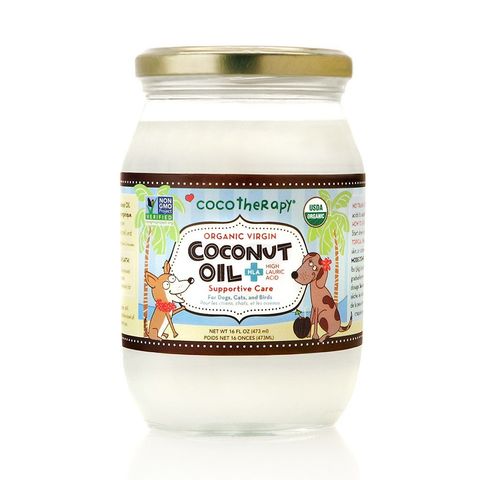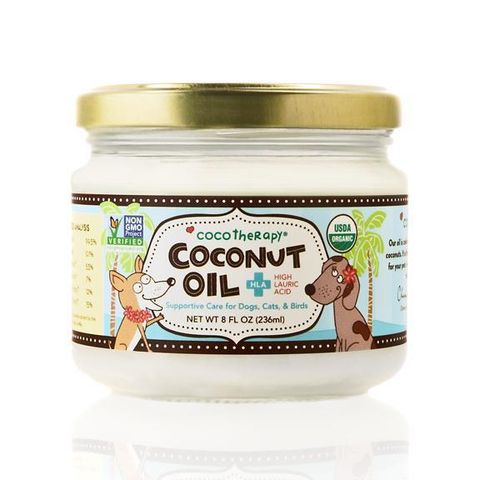
Recommended Article #28Jun24
Hi, Pet Parents Resources is a platform, where we share with you, what we research as pet parents ourselves. Here, we curate and give, what we hope would be, interesting to important informative articles, videos and even podcasts from our brand creators, experts, researchers, and more all over the world, to aid you in making better choices for your pets.
This recommended article "Can Coconut Oil Help with Thyroid Health?" is curated and sourced from CocoTherapy. If you loved this article, please do feel free to share it around.
Can Coconut Oil Help with Thyroid Health?
The thyroid gland is an essential gland in the body that consists of two small lobes shaped like butterflies on either side of your pet's trachea (windpipe). Let's look at the causes, symptoms, diagnosis, and treatment of thyroid disorders in dogs and cats and how coconut oil is thought to support healthy thyroid function.
The thyroid gland produces thyroid hormones, including thyroxine (T4) and triiodothyronine (T3). These hormones play a large role in metabolism, and major health problems can occur when they are not produced at normal levels.
In today's post we'll take a look at the causes, symptoms, diagnosis, and treatment of thyroid disorders in dogs and cats. We'll also explain how coconut oil is thought to support healthy thyroid function.
Causes and Symptoms of Thyroid Disorders
There are two types of thyroid disorders – hypothyroidism and hyperthyroidism. Hypothyroidism typically affects dogs and is characterized by a lack of thyroid hormone production. Cats are far more likely to develop hyperthyroidism, an excess of thyroid hormone. Let's take a look at the causes and symptoms of each.
Hypothyroidism
Hypothyroidism is rare in cats, but it is common in medium and large-sized dogs. Certain breeds including Golden Retrievers, Doberman Pinschers, and Boxers are predisposed to the disorder. It is also more commonly diagnosed in middle-aged dogs.
The most common cause of hypothyroidism in dogs is lymphocytic thyroiditis, an auto-immune disease that causes the body to attack and kill the cells of the thyroid gland. Hypothyroidism can also be caused by a disease called idiopathic thyroid gland atrophy that causes normal thyroid tissue to be replaced by fat tissue. In both these cases, the thyroid gland is unable to produce sufficient levels of thyroid hormones.
The underlying causes of these two diseases are unclear, but some veterinarians believe that environmental factors such as chemicals in medications and vaccines play a role. In rare cases, hypothyroidism can be caused by other diseases – including cancer of the thyroid gland.
Symptoms of hypothyroidism in dogs include weight gain, lethargy, skin problems, hair loss, and intolerance to cold. Dogs with the disorder may also display behavioral symptoms such as depression, anxiety, and even unexplainable aggression.
Hyperthyroidism
Hyperthyroidism is a very rare condition in dogs, but over 10 percent of cats aged 10 years and older have the disease. Any breed of cat can be affected, but almost all cases of hyperthyroidism occur in older animals.
Most cases of hyperthyroidism are caused by a benign tumor on the thyroid gland which leads to overproduction of thyroid hormones. Although the root cause of hyperthyroidism in cats is unknown, recent research suggests that the disease may be linked with exposure to flame retardant chemicals, fish-flavored cat food, fish-based diets, and soy products.
The most common symptoms of hyperthyroidism in cats are weight loss and increased appetite. Cats may also display symptoms such as excessive thirst, vomiting, diarrhea, hyperactivity, and increased shedding.
Diagnosis and Treatment of Thyroid Disorders
Both hypothyroidism and hyperthyroidism can be diagnosed based on blood test results. If your dog has hypothyroidism, your veterinarian will prescribe medication to manage the condition. Treatment requires life-long medication to provide your dog's body with thyroid hormone. Periodic blood tests will also be necessary to check levels of hormone in the blood.
There are several options available for cats diagnosed with hyperthyroidism. In some cases, your veterinarian may decide to surgically remove benign tumors on the thyroid gland. But more commonly, a course of radiotherapy or life-long medication and blood tests will be used to treat the disorder.
Coconut Oil and Thyroid Disorders
As we mentioned at the start of this post, the thyroid gland has a very important role to play in the production of hormones that regulate metabolism. Unlike polyunsaturated fats that can have a harmful effect on the thyroid and depress thyroid activity, coconut oil is a healthy saturated fat that supports thyroid function.
That's right. Coconut oil actually helps prevent thyroid disorders. According to Dr. Joseph Mercola, in an article from January 2018:
"Unlike soy oil and other vegetable oils, coconut oil does not interfere with thyroid function. It has anti-inflammatory properties that can help reduce inflammation that may lead to hypothyroidism and hyperthyroidism."
About two-thirds of the fats in coconut oil are medium-chain triglycerides (MCTs). When consumed, the body breaks down MCTs and utilizes medium-chain fatty acids (MCFAs) for their beneficial properties.
MCFAs are immediately transported from the digestive tract into the liver without needing bile to be metabolized. They are then used for energy rather than being stored in the body like other types of fats.
The MCFAs in coconut oil are especially beneficial for dogs with hypothyroidism as they help balance the thyroid, promote weight loss, and provide a higher level of energy and vitality.
Coconut oil also contains high levels of lauric acid. Taken orally, the body converts lauric acid to Monoglyceride Monolaurin which has potent antimicrobial properties. The following quote from PositiveMed explains why this is beneficial for pets with thyroid disorders:
"Hypothyroidism and hyperthyroidism are often caused by autoimmune disorders that attack the body, causing inflammation and destruction of tissue. Coconut oil has anti-inflammatory properties that reduce inflammation and inflammation triggers such as intestinal microorganisms."
Wrapping Up
Most dogs and cats with thyroid disease respond very well to treatment, but it's important that the disease is diagnosed as early as possible. If you suspect your pet has a thyroid disorder, consult with your veterinarian as soon as possible.
Coconut oil has been shown to support thyroid function, and can be a wonderful addition to the support plan of pets suffering from hypothyroidism or hyperthyroidism. But it's important to choose the right oil to support your pet's health.
CocoTherapy coconut oil is a therapeutic-grade oil that has a high percentage of beneficial medium-chain fatty acids, containing at least 64%. Our oil also contains 53% lauric acid, compared to 40% in grocery or cooking-grade coconut oils.
Finally, if you have a dog or cat on thyroid medication, please do not stop their medication without discussing treatment options with your veterinarian.
The good news is, you can purchase CocoTherapy Organic Therapeutic Grade Coconut Oil from our retailers today!
You may find more interesting reads from JOOF Holistic Pet today! Look out for loads of information on our product pages, social media, especially our Pet Parent Resources page.
JOOF Holistic Pet, a Singapore online pet store that focuses on the holistic well-being of your beloved furkid. Our recommended products aim to support and improve health, emotional and physical well-being, and help your pet have a better quality of life without compromise. Look out for Essential, Trendy and Premium quality pet products that are specially curated, with the pet parents concerns' as a priority.
This blog first appeared on the CocoTherapy website, where this article "Can Coconut Oil Help with Thyroid Health?" was curated and sourced from.
Original source: Can Coconut Oil Help with Thyroid Health?
Thank you for reading! We hope to bring you more informative and exciting articles from other resources and our varying retail brands. Through them, we hope more and more pet parents could become their pet's wellness heroes, proactively taking control of their pets’ foundational health from within, with JOOF Holistic Pet - www.joofholisticpet.sg 😊
Disclaimer:
JOOF Holistic Pet has curated and reproduced this article in good faith, which may contain an element of consumer opinion, but cannot be held responsible for any information inaccuracies in it or any use assumed from this information by the reader. JOOF Holistic Pet welcomes positive recommendations for holistic healthcare products, but does not necessarily endorse the author’s opinion. We acknowledge each animal is an individual and may react differently to the highlighted product/s, and that there may also be other similar effective products available.
General recommendations made by JOOF Holistic Pet are solely for informational and educational purposes, and are not a substitute for the appropriate veterinary care. It is important to always consult professional help if you have concerns about your furkid’s health.


